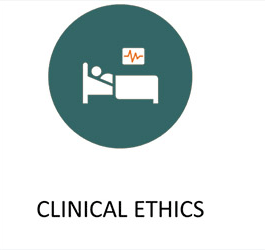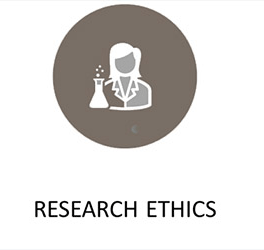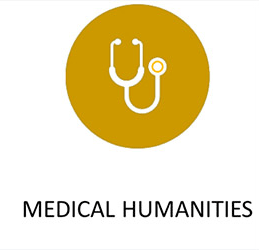The Program in Bioethics and Medical Humanities offers three graduate certificates in Clinical Ethics, Research Ethics, and Medical Humanities. Each Certificate is a 12-credit hour program and can be completed in one year, either in person or by distance learning. The courses in these certificates are available to distance students synchronously through live video teleconference, so distance students attend class along with the students taking the classes in person.
The Certificates are also “stackable”, so successful Certificate students can apply all of their credits earned for the Certificate to a MS in Bioethics and Medical Humanities. Scroll down for more details on stacking certificates.
The Clinical Ethics Certificate is designed to provide clinical professionals, students of medicine, ethics committee members, and non-clinical health care professionals (e.g., patient advocates and hospital attorneys) with an understanding of medical ethics, current bioethical controversies, and practical and classroom experience in clinical ethics. It is designed for persons who wish to better understand ethics in clinical medicine or conduct clinical ethical consultations.
This certificate consists of four courses, three of which are core courses and one elective option. Upon completion of the Certificate Program, students will have completed 12 credit hours of coursework.
The core courses are:
- Foundations of Bioethics
- Clinical Ethics
- Current Controversies in Bioethics
The final 3 hours of coursework is an elective option, which can be selected by the student from the other core courses in the MS in Bioethics and the Medical Humanities or can be selected from the various electives offered through the same program.
Examples include:
- Ethical Theory
- History of Medicine
- Neuroethics
- Pandemic Ethics
The Research Ethics Certificate provides clinical and non-clinical professionals (including regulatory or administrative personnel), Institutional Review Board members and students of medicine engaged in or planning to conduct medical research with an understanding of medical ethics, current bioethical controversies, and a focus on research ethics. It is designed for persons who want to conduct ethical research and/or better protect human subjects through informed ethical assessment.
This certificate consists of four courses, three of which are core courses and one elective option. Upon completing the Certificate Program, students will have completed 12 credit hours of coursework.
The core courses are:
- Foundations of Bioethics
- Research Ethics
- Current Controversies in Bioethics
The final 3 hours of coursework is an elective option, which can be selected by the student from the other core courses in the MS in Bioethics and the Medical Humanities or can be selected from the various electives offered through the same program. Examples include:
- Ethical Theory
- History of Medicine
- Neuroethics
- Pandemic Ethics
The Medical Humanities Certificate is designed to provide healthcare professionals, students of medicine, and interested lay members of the public with an understanding of the fundamental principles of medical humanities and the study of medical history, narrative medicine, and/or the intersection of film and literature with medicine. It is designed for persons who wish to develop a deeper understanding of the connection between medicine and art, history, and literature.
This certificate consists of four courses, one of which is a core course, two of which are selected from a group of three possible options, and one elective option. Upon completing the Certificate Program, students will have completed 12 credit hours of coursework.
The core course is:
- Medical Humanities
Two more courses shall be taken from the following three:
- Narrative in Medicine
- History of Medicine
- Medicine in Literature and Film
The final 3 hours of coursework is an elective option, which can be selected by the student from the other core courses in the MS in Bioethics and the Medical Humanities or can be selected from the various electives offered through the same program.
Examples include:
- The Doctor as Author
- The End of Life in Film and Literature
- Neuroethics
- Medicine and Identity
- Pandemic Ethics
 • Medical Humanities
• Medical Humanities
¤ Narrative in Medicine
¤ History of Medicine
¤ Elective
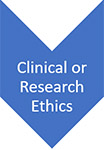 • Foundations of Bioethics
• Foundations of Bioethics
• Current Controversies in Bioethics
• Clinical Ethics [OR] Research Ethics
• Elective
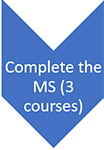 • Medicine and Identity and the other of Clinical Ethics [OR] Research Ethics (Bioethics Track)
• Medicine and Identity and the other of Clinical Ethics [OR] Research Ethics (Bioethics Track)
• [OR] Medicine in Literature and Film and one more elective (Medical Humanities Track)
• Capstone Course
The Certificate in Medical Humanities can “stack” with either the Certificate in Research Ethics or the Certificate in Clinical Ethics to provide a simple path to the MS in Bioethics and Medical Humanities.
The 12 credit hours from the Certificate in Medical Humanities plus 12 unique credit hours from the Certificate in Research Ethics or the Certificate in Clinical Ethics all can apply towards the completion of a full MS in Bioethics and Medical Humanities, with only 9 additional hours needed to obtain the Master’s degree. The process for this is shown above. Since there are two tracks in the MS degree, one in Bioethics and the other in Medical Humanities, there are two slightly different paths to completing the full MS degree, depending upon which track the student prefers.
Since all the courses taken in the course of earning the Certificates will count towards the final MS degree, the cost of obtaining the two Certificates plus the MS will be the same as obtaining the MS.
Applicants must have completed a bachelor’s degree by the time of admission.
Required Application Materials:
- Official transcript(s) from each college or university attended.
- A personal statement.
- Resumé or CV.
- One to three letters of recommendation are suggested but not required.
- International applicants are also required to submit a TOEFL or IELTS score report.
- No standardized tests (e.g., GRE, MCAT, etc.) will be required.
Current students in the Tulane School of Medicine (or students also applying to the School of Medicine) may apply with only a personal statement and resumé/CV, as their transcripts (and letters of recommendation) can be pulled from their medical school application.
Applications may be submitted through our online portal:
- Click on the button below and register to create an account
- Select Biomedical Sciences
- Select the Certificate you wish to apply for
Application Deadline
Certificate students may start their coursework in the Fall, Spring, or Summer semesters of any given year. Applications are due for the Fall semester on July 15, the Spring semester on December 15, and the Summer semester on April 15.
Contact Information
For further information contact Dr. Tzofit Ofengenden, Assistant Director of Graduate Studies, at TulaneMedicalEthics@tulane.edu, or Dr. Stephen Hanson, Director of Graduate Studies at shanson4@tulane.edu.
